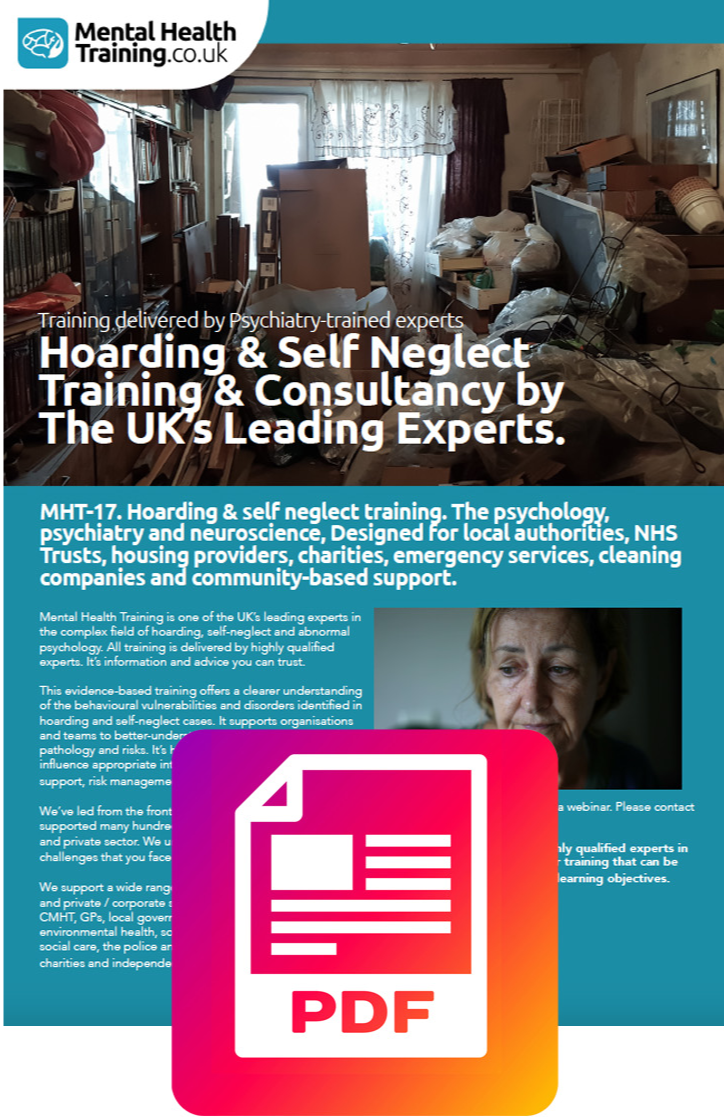MHT17 – Hoarding and Self-Neglect Training from the UK’s experts
Mental Health Training is one of the UK’s leading experts in the complex field of hoarding, self-neglect and abnormal psychology. All training is delivered by highly qualified experts. It’s information and advice you can trust.
This evidence-based training offers a clearer understanding of the behavioural vulnerabilities and disorders identified in hoarding and self-neglect cases. It supports organisations and teams to better understand the associated psychology, pathology and risks. It’s high-quality training that will influence appropriate interventions, advocacy, general support, risk management and cleansing.
Hoarding Behaviours & Self Neglect Training. The psychology, psychiatry, neurology and best-practice interventions.
This is an evidence-based training workshop that addresses the issues and challenges associated with hoarding behaviours and self-neglect science. It equips staff with the knowledge and skills essential to effective support and safeguarding.
This includes
- Understand the psychology associated with hoarding behaviours
- The ability to recognise psychiatric and neurocognitive symptoms that may be driving the behaviours
- Risk assessments practices and screening tools
- Skills to improve motivation – Motivational Interviewing strategies dedicated to hoarding and self-neglect interventions and support
- Better-understand capacity law and capacity arguments
- The skills to manage de cluttering, cleansing and improving longer term outcomes.
Hoarding is defined by the failure to discard large numbers of possessions regardless of their apparent value. Consequently, living spaces may precluded from everyday use.
Self-neglect, or the failure to appropriately manage a domestic environment is more commonly associated with cognitive disease or poor decision taking. It may co-occur with hoarding behaviours, and presents with a range of different challenges
Hoarding is commonly associated with the following psychiatric syndromes
- Hoarding Disorder (DSM5)
- Obsessive Compulsive Personality Disorder / Anankastic Personality Disorder (DSM5 / ICD11)
- Obsessive Compulsive Disorder (DSM5 / ICD11)
- Behavioural Variant Fronto Temporal Dementia (BvFTD) / Diogenes Syndrome (DSM5 / ICD11)
Self-neglect is more commonly associated with
- Cognitive and neurocognitive impairment / BvFTD symptoms.
- Substance dependency and mental health needs further complicate the picture.
Issues associated with hoarding behaviours and self-neglect in general can be a significant challenge to housing providers, social care / social support teams , enforcement and mental health service. These difficulties commonly include
- The nature of any mental disorder driving the behaviour
- Lack of knowledge within primary care and CMHT services
- Confusion or disagreement over capacity factors
- The resistant nature / psychology of the client / service user (particularly interventions ‘backfiring’)
- Confusion with different agencies and services (that misunderstand the nature and diagnosis of the client / service user)
- Lack of skills and knowledge (how to effectively motivate the client / service user, manage the process of de-cluttering / cleansing
- The client / service user’s apparent resistance to engage or their potential indifference / apathy or lack of motivation
This evidence-based training is delivered by a psychology / psychiatry qualified facilitator. It delivered in an accessible style that meets delegates’ learning / communication needs.
We have extensive training experience within this sector and can support delegates with free post-training support on an informal basis. This training is a one-day event and can be delivered vis webinar or onsite / face to-face.


